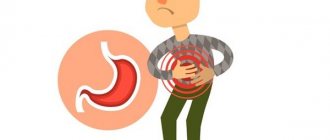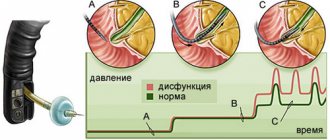Peptic ulcer disease and antibiotics - when their use is justified
Studies of factors that provoke the appearance and development of peptic ulcer disease have shown that in more than 80% of cases the cause of this disease is the activity of the bacterium Helicobacter pylori. To get rid of the consequences of the activity of this bacterium and cure gastric ulcers, various antibacterial therapy regimens have been developed, in which antibiotics play a leading role.
These drugs are of natural or semi-synthetic origin; they inhibit the vital activity of cells of a certain type, which allows for the targeted destruction of pathogenic microorganisms. They are used with caution, carefully analyzing side effects and taking into account contraindications to the use of drugs.
Metronidazole
The drug belongs to the category of antiprotozoal agents and antimicrobial drugs with a wide spectrum of action. The antibiotic is obtained synthetically. The mechanism of antibacterial action is to block the tissue respiration of microbes: the production of proteins in the cells stops, and the bacterium dies.
The daily dosage for gastric ulcer is given within 1000 mg. Taking metronidazole tablets does not depend on food intake. The duration of the therapeutic course is 2 weeks. According to the available instructions for use, metronidazole has a number of contraindications. First of all, leukopenia is a decrease in the number of leukocytes in the blood, organic diseases of the central nervous system. In addition, an absolute contraindication to the prescription of metronidazole is increased individual sensitivity to the components of the drug.
In the first trimester of pregnancy, during lactation, metronidazole is not prescribed. In subsequent trimesters, the drug is used extremely carefully. Contraindications include insufficiency of liver or kidney function.
https://youtu.be/LjDjIXpGaNg
Complex treatment of stomach ulcers - groups of drugs
A stomach ulcer cannot be cured with antibiotics alone, since it is a complex lesion that affects the most complex mechanisms of the digestive process. For complex treatment, drugs from various pharmacological groups are used:
- Histamine receptor blockers - used to reduce the production of hydrochloric acid. These are Quatemal, Cimetidine, Famotidine, Ranitidine, Roxatidine.
- Proton pump inhibitors - drugs in this group are used in the complex treatment of acid-dependent disorders of the stomach by blocking the proton pump, which produces acid that aggressively acts on the mucous membrane. An excellent addition to antibiotic therapy for ulcers would be Omeprazole, Nolpaza, Esomeprazole, Omez.
- Gastroprotectors are astringent and enveloping agents to protect the inner lining of the stomach from the destructive effects of hydrochloric acid. This group includes Sukrafalt, Keal, Sukras, Venter. The result of the action of gastroprotectors is the protection of the mucous membrane in conditions of disturbed acid-base balance.
- Anticholinergics - to block the influence of the nervous system on the functioning of the muscles responsible for contraction of the stomach. Gastrozepine, Gastroceptin, Pirenzipine, Telenzelin. Thanks to the action of drugs in this group, the tone of the transverse muscles of the stomach increases and the production of overly active gastric juice decreases.
- Antacids - to neutralize hydrochloric acid. Maalox, Almagel, Phosphalugel will relieve pain and burning and eliminate negative symptoms.
- Ganglion blockers - used to inhibit the transmission of nerve impulses that cause contractile and secretory activity;
- Antispasmodics - to relieve muscle spasms, relieve pain in the stomach, and improve blood circulation in its walls.
- Bismuth-containing preparations - to reduce the activity of the bacterium Helicobacter pylori, envelop inflamed areas of the mucous membrane with a protective layer, and neutralize enzymes. De-nol, Vikain, Vikair, Vis-nol alleviate the symptoms of the disease.
- Prokinetics - to streamline metabolism and stimulate complete digestion. Motilium, Ganaton, Metoclopramide, Motilak relieve unpleasant symptoms (vomiting, nausea, heartburn), the effectiveness of prokinetics doubles when used together with antiseptics.
In addition to the above remedies, vitamin complexes enriched with microelements are used. It is optimal to use these drugs during the rehabilitation period; they help restore the affected mucous membrane and activate metabolism.
Antibiotics – 4 effective drugs
More than 500 types of antibiotics are used in treatment regimens for this gastrointestinal pathology. The most commonly used drugs are:
Clarithromycin
The drug is from the same line to which Erythromycin belongs, successfully used by more than one generation of patients. In comparison, Clarithromycin is much more resistant to the effects of hydrochloric acid, is quickly absorbed and has a long period of effect on the human body. In the absence of contraindications for use, it is the main remedy from the pharmacological group of drugs for the treatment of stomach ulcers.
Amoxicillin
An antibiotic from the penicillin group. Unlike its predecessor, Amoxicillin is more resistant to the destructive effects of gastric enzymes, has a long half-life from the body, and is absorbed by more than 90%. These features allow the drug to be used infrequently - twice a day.
Metronidazole
It has been used for the treatment of peptic ulcers caused by Helicobacter pylori for many years due to its reliability and effectiveness. Metronidazole belongs to the same group as the natural antibiotic Azomycin, produced by special bacteria streptomycetes. The action of Metronidazole is based on the destruction of the DNA of microorganisms by its components.
Tetracycline
The action of the drug is based on its disruption of protein synthesis of bacterial cells, which entails the death of microorganisms. The effectiveness of Tetracycline extends to a wide range of microorganisms, including enterobacteria Helicobacter pylori.
Basic treatment regimens for the disease
To effectively treat stomach ulcers, a two-stage scheme is used, consisting of several steps:
- At the first stage, two antibiotics are used in combination with proton pump inhibitors. The most commonly used are Clarithromycin and Metronidazole. Their dosage is calculated by the attending physician depending on the individual characteristics of the disease. If side effects occur from the components of this scheme, their analogues are used. The predicted result of such treatment is that Helicobacter pylori almost completely ceases to exist in the patient’s body.
- After the intermediate diagnosis, the second stage is carried out. The remaining bacteria and the consequences of their vital activity are eliminated with a combination of Metronidazole and Tetracycline. Complex treatment is complemented by Bismuth preparations, proton pump inhibitors (Omeprazole), histamine receptor blockers (Ranitidine).
There is another approach to treating this disease, positioned as tritherapy:
- 2 antibiotics,
- antiseptic or proton pump inhibitor.
Antibiotics in this regimen complement each other, the dosage of the drugs is calculated very accurately, taking into account individual characteristics (age, weight of the patient, concomitant diseases).
Quad therapy involves the use of the following drug groups:
- 2 antibiotics,
- Bismuth preparations,
- proton pump inhibitors.
This technique is used if the Helicobacter pylori strain present in the patient is extremely resistant to the action of antibacterial drugs, as well as if the results of previous treatment are unsatisfactory.
To speed up recovery during all stages, the doctor recommends antispasmodics, antiemetics, regenerative, and painkillers. In addition, you can use vitamin complexes, traditional medicine recipes in the form of decoctions and herbal infusions after consulting a doctor.
The table shows the effectiveness of eliminating Helicobacter pylori depending on the chosen treatment regimen. The given schemes are approximate; the exact selection of drugs should be carried out by the attending physician. The duration of treatment varies from 14 to 30 days.
If the dosage of the drug is calculated incorrectly, or the medication regimen is violated, undesirable side effects may occur:
- Headache;
- Cardiopalmus;
- Weakness and increased sweating;
- General deterioration in health;
- Diarrhea alternating with constipation;
- Urinary incontinence.
Any negative manifestation should be reported to your doctor in order to adjust the dose and change the treatment regimen.
Possible side effects
Along with undoubted therapeutic advantages, antibiotics have a number of disadvantages and side effects. The risk of developing these when taking an antibiotic, especially uncontrolled, is high.
- Long-term use of antibiotics adversely affects the functions of the central nervous system. Auditory and visual hallucinations, dizziness, apathy, depressive states may occur, and consciousness is sometimes darkened or confused. The development of convulsive syndrome is possible. Of course, such consequences from taking antibiotics are not possible for every patient, but this should be kept in mind. Antibiotics have strict indications for use. The appearance of serious side effects becomes a reason to discontinue medications and select an alternative treatment regimen.
- From the stomach and intestines, nausea, vomiting, diarrhea, abdominal pain and dysbacteriosis may occur.
- Disorders of the urinary system, temporary urinary retention or urinary incontinence.
- Liver disorders.
Antibiotics are not prescribed during pregnancy. Antibiotics should be used with caution if there is a marked decrease in immune defense.
Every antibacterial drug, even a safe one, in a certain scenario leads to the development of unpredictable complications. Mild consequences from uncontrolled use of antibacterial drugs are headache and dizziness. Long-term and severe sleep disorders, high anxiety, prolonged depression and fears are described as severe symptoms. In difficult cases, the body reacts to the use of antibacterial therapy with acute psychotic states, depersonalization and disturbances in orientation in the environment. Such side effects are extremely rare.
Much more often, doctors observe side effects in the form of nausea, diarrhea, and vomiting. Possible violations of the dental plan. The blood system sometimes reacts by decreasing the level of platelets and leukocytes and developing bleeding. Allergic reactions to antibacterial drugs are common. They manifest themselves in the form of dermatitis or bronchitis, skin rash, and fever.
If even the slightest signs of a side effect appear, you need to stop taking the drug and consult a doctor.
Antibiotics for stomach and duodenal ulcers are necessarily included in the drug treatment regimen. But therapy that can save a person from developing pathological defects in these parts of the gastrointestinal tract should only be carried out in combination. A unilateral approach, without the use of preventive measures, will be ineffective.
In order to forget about the disease, antibacterial agents alone, although they are considered basic, are not enough. In order to speed up the recovery process, specialists in the treatment of patients with peptic ulcer and duodenal ulcer use various groups of drugs in combination. They are selected depending on what caused the disease and at what stage of development it is.











